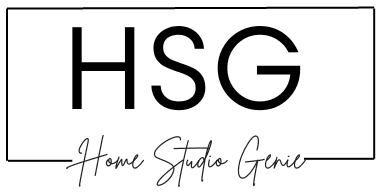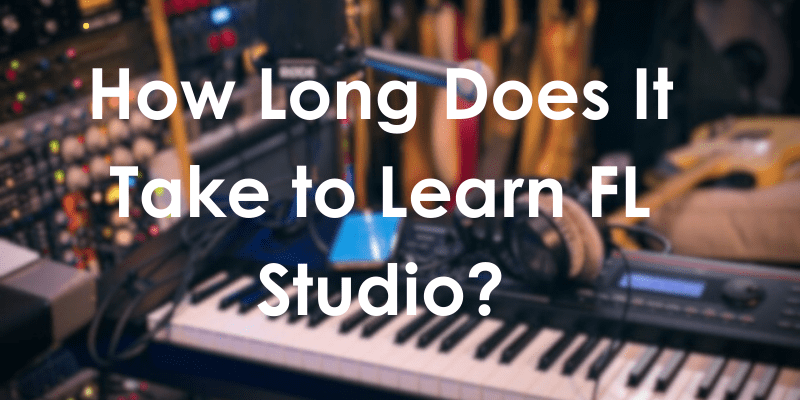Ever wondered just how long it takes to truly master FL Studio? Get ready to uncover the secrets and unlock your creative potential as we delve into the fascinating world of FL Studio.
In this blog post, we’ll take you through the ins and outs of this versatile music production software. We’ll provide practical insights and actionable advice along the way.
So, whether you’re starting from scratch or already have some experience, this is your ultimate guide to understanding the learning journey and discovering the time it takes to excel in FL Studio.
Many of these factors will affect how long it takes to learn FL Studio.
Let’s jump straight in.
How Long Does It Take to Learn FL Studio?
Learning FL Studio will take around six weeks to three months for a total beginner to learn. Some people grasp the basics relatively quickly, while others may need more time and practice.
The time it takes to learn FL Studio varies based on individual factors. These factors include prior experience with music production and familiarity with similar software.
Here are a few more factors that affect learning time for FL Studio 20 Producer Edition:
Try To Set Realistic Expectations
When it comes to learning FL Studio, it’s essential to set realistic expectations. Learning any complex software takes time and effort, and FL Studio is no exception.
| Key Points |
| – Learning FL Studio requires a realistic mindset and an understanding of the learning curve. |
| – Avoid the expectation of creating professional-sounding tracks immediately. |
| – Acknowledge that proficiency in FL Studio comes with practice and experience. |
| – Set achievable goals and focus on continuous improvement. |
| – Be patient with yourself and embrace the learning process. |
| – Seek support and resources to aid in your learning journey. |
While it’s natural to be eager to create professional-sounding tracks right away, it’s important to remember that mastering FL Studio is a gradual process.
Be patient with yourself and understand that it will take time to become proficient in all aspects of the software.
The Learning Curve and Your Experience Matter
The learning curve for FL Studio can vary depending on your previous experience with music production and familiarity with similar software.
If you’re completely new to music production, it may take some time to grasp the basic concepts and workflows.
However, if you have prior experience with other DAWs or music software, you may find it easier to adapt to FL Studio’s interface and features.
Do you have Prior Musical Knowledge?
It’s not mandatory to have extensive musical knowledge before learning FL Studio.
Having a basic understanding of music theory and composition can significantly enhance your learning experience.
Concepts such as rhythm, melody, and chord progressions will play a crucial role in creating engaging tracks.
If you’re new to music theory, consider dedicating some time to learning the fundamentals alongside your FL Studio journey.
It’s also a great idea to use a Midi Keyboard Controller for playing around and experimenting with the different sounds in FL Studio. You’ll get your ideas across faster and a tactile feel is great for making the production process enjoyable.
Another area is with technical aspects of installing FL and fixing common problems in DAWS.
Use Learning Resources and Tutorials
FL Studio offers an extensive range of learning resources to aid aspiring producers. From official documentation and tutorials to online courses and community forums, there are plenty of options to choose from.

Take advantage of these resources to gain a solid foundation in FL Studio. Structured tutorials and courses can provide step-by-step guidance.
Forums and communities allow you to connect with other users, ask questions, and learn from their experiences.
Dedication and Consistency Are Keys
Like any skill, learning FL Studio requires dedication and consistency.
Make a commitment to allocate regular time for practice and learning.
Consistency is key in developing your skills and familiarizing yourself with FL Studio’s functionalities.
Whether it’s dedicating a few hours each day or setting aside specific days of the week, establish a routine that works for you and stick to it.
Familiarize Yourself with the Interface
To kickstart your FL Studio journey, it’s essential to familiarize yourself with the software’s interface.
Spend time exploring different sections and panels, and customize the workspace to suit your preferences.
Understanding the layout and organization of FL Studio 20 will allow you to navigate the software more efficiently as you progress.
Start With Basic Features
As you begin Learning FL Studio, focus on understanding the basic features that form the foundation of music production.
The step sequencer and piano roll are two fundamental tools used for creating patterns, melodies, and drum sequences.
Familiarize yourself with their functionalities and learn how to use them effectively.
Explore Advanced Features
Once you’re comfortable with the basics, it’s time to explore the advanced features. Automation and modulation allow you to add movement and dynamics to your tracks.
Dive into the world of plugins and effects to enhance your sounds and experiment with different textures.
The more you explore these advanced features, the more control, and creativity you’ll have over your music.
Practice with Sample Projects
One effective way to learn FL Studio is by practicing with sample projects. These can be stock projects or just songs you like from your favorite artists.
Analyze and deconstruct existing tracks to understand their structure, arrangement, and mixing techniques.
Reverse engineering allows you to learn from established producers and gain insights into their creative process.
By working with sample projects, you can apply what you’ve learned to your own compositions and develop a deeper understanding of FL Studio’s capabilities.
Experiment with Different Genres
FL Studio is a versatile tool that can be used to create music across various genres.
Great Genres for Learning FL Studio:
| # | Genre | Difficulty |
|---|---|---|
| 1 | Electronic | Easy |
| 2 | Hip Hop | Moderate |
| 3 | Pop | Easy |
| 4 | EDM (Electronic Dance Music) | Moderate |
| 5 | Trap | Moderate |
| 6 | House | Moderate |
| 7 | R&B | Easy |
| 8 | Dubstep | Moderate |
| 9 | Rock | Difficult |
| 10 | Ambient | Easy |
The “Difficulty” column represents the level of difficulty in producing each genre using FL Studio.
As you progress, you can step out of your comfort zone and experiment with different styles and genres.
Trying out different genres allows you to explore new techniques. It also expands your musical palette and develops versatility as a producer.
Embrace the opportunity to explore diverse sounds and find your unique artistic voice.
As soon as you’re dabbling in other genres, you’ll be able to finally have the answer to learning FL Studio.
Collaboration and Feedback Are Great
Collaborating with other producers and seeking feedback on your work is an excellent way to accelerate your learning in FL Studio.
Join online communities, music production forums, and social media groups dedicated to FL Studio. These are usually free.
Engage in collaborative projects where you can learn from and collaborate with fellow producers.
Sharing your work and receiving constructive criticism can provide valuable insights and help you improve your skills.
Expand Your Skills with Plugins and VSTs
FL Studio offers a wide range of plugins and VSTs that can expand your creative possibilities.
Experiment with different plugins and explore their unique features and sounds.
Plugins like synthesizers, samplers, and audio effects add depth and complexity to tracks.
They enhance your workflow and elevate your music production. When coupled with a great Midi Keyboard Controller, you can also work faster and enjoy the process while you’re at it.
Familiarize yourself with the capabilities of different plugins and explore new sonic territories.
Take Advantage of Online Communities
The FL Studio community is vibrant and active, with numerous online forums, groups, and communities dedicated to the software.
| Advantages of Online Communities For Learning FL Studio |
| 1. Access to a diverse range of knowledge and expertise. |
| 2. Opportunity for networking and collaboration with like-minded individuals. |
| 3. Platform for seeking advice, guidance, and support from a community of peers. |
| 4. Sharing and receiving feedback on creative works, projects, or ideas. |
| 5. Keeping up-to-date with industry trends, news, and developments. |
| 6. Building a personal brand and establishing credibility in a specific field. |
| 7. Engaging in discussions and debates to expand perspectives and knowledge. |
| 8. Discovering new opportunities, partnerships, or career prospects. |
| 9. Participating in events, webinars, or workshops for continuous learning. |
| 10. Access to exclusive resources, such as tutorials, templates, and guides. |
Joining these communities provides opportunities to connect with like-minded producers, share knowledge, and learn from experienced users. The more you interact with other learners will affect how long it takes to learn FL Studio.
Engage in discussions, ask questions, and participate in challenges and competitions. The FL Studio community can serve as a valuable resource for inspiration, feedback, and continuous learning.
Sources:
https://www.image-line.com/fl-studio-learning/fl-studio-online-manual/html/basics_workflow.htm
FAQs
Can I learn FL Studio without any musical background?
Absolutely! FL Studio accommodates users regardless of musical background. Dedication and practice are key.
Are there shortcuts to speed up the learning process?
Consistent practice, structured learning, and guidance from experienced producers can accelerate your progress.
How long does it take to master FL Studio?
Mastery time varies based on experience, dedication, and learning investment. Stay committed and patient.
Is it hard to learn FL Studio?
FL Studio has a learning curve, but practice and available resources make it manageable.
Can FL Studio be used for live performances?
Yes, FL Studio offers a performance mode for real-time pattern triggering and effects.
Is FL Studio suitable for professional music production?
Yes! Many professionals use FL Studio due to its features and intuitive workflow.
Can I collaborate with other musicians using FL Studio?
Yes, FL Studio supports collaboration through shared projects and simultaneous work.
What are the system requirements for FL Studio?
Can I use external hardware with FL Studio?
Yes, FL Studio supports MIDI controllers, synthesizers, and audio interfaces for enhanced workflow.

Mike is a skilled musician, guitar technician, and music producer with a passion for audio and gear. He excels in teaching guitar, editing podcasts/videos, and creating captivating soundscapes using cutting-edge hardware, software, and plugins. Mike’s talent and commitment make him highly sought-after in the industry, inspiring fellow musicians worldwide.


